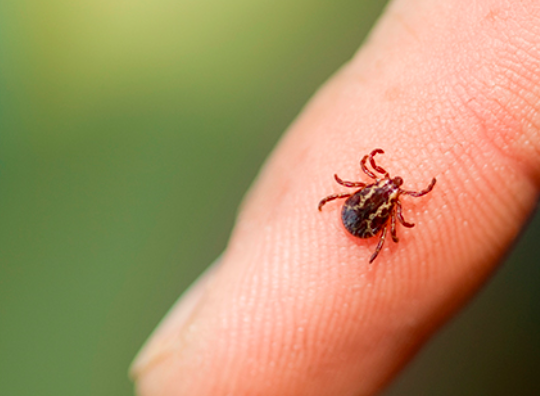To understand Lyme disease you need to know that there are two forms. The Early stage, or early disseminated stage, and the late stage. The early stage means the infection occurred in recent months, normally considered less than 3 months. This stage is called ACUTE lyme disease- this means it is a new, early stage infection. These cases are much easier to treat with antibiotics alone, and are treated far more successfully than late stage Lyme.

The Late stage lyme is generally considered to be a case that has persisted for more than 3 months, although there is no hard definition for it. This is when the illness is not nearly as responsive to antibiotics alone. When someone just didn’t know they had been bitten by an insect carrying the Lyme Spirochetes, or they were never tested or treated at all, they can end up living with a case of CHRONIC Lyme disease and yet have no idea that is what is causing their symptoms. How can this happen? Certain ticks can be the size of a period at the end of a sentence and so will never be seen. Soft bodied ticks can bite, and fall off within minutes, so they are never seen. Studies show that only 30-50% of individuals ever see the classic bull-eye rash, so unless a person is particularly astute to Lyme disease and its symptoms, they really just had no idea that they were infected. Also, the symptoms can seem like a summer flu bug and so the person may have never even gone to the doctor, much less gotten tested. When more symptoms start showing up in the years to follow, we simply learn to live with them- to make them our “new normal”, because our doctors simply can’t find anything wrong with us and we are offered anti depressants instead of the treatment we truly need.
These are just a handful of reasons why so many of us can go decades with this infection and have no idea what the root cause of our symptoms are. Another complexity that makes late stage lyme disease so hard to diagnose is that the symptoms can look vastly different from person to person. That is because the stronger the person’s immune system is, the fewer ( if any) symptoms they will experience. By contrast, those of us who unknowingly had compromised immune systems, will develop symptoms ranging from simple knee pain to complete debilitation.

When we hear about Lyme disease on TV or social media, it is often about the acute form. Something that seems to most people, even doctors, to be easy to diagnose and easy to treat with antibiotics. I have written quite a bit about how poor testing is for Lyme disease so I won’t go into all of that again, but to be clear, there is NO gold standard test for Lyme disease and most medical societies know this. More and more tests are being developed to help do a better job at finding it, however those of us who practice in this space are very well aware that it is extremely difficult to get a conclusive, positive test for this illness. The bug that causes Lyme disease, Borrelia, is highly evasive of the immune system. It is thought to be the “super bug of all super bugs”, and so the antibodies and other markers doctors are looking for in the standard tests are being suppressed by the Borrelia bugs, so those antibodies are not there to be found, though the person actually has the illness. Due to this highly evolved nature of Borrelia, attempts at vaccine creation have been extremely unsuccessful and done more harm than good.
I myself was a victim of the poor testing and extensive ignorance around this illness. Needless suffering for 15 years has been powerful motivation for me to start a practice to help others suffering with mysterious debilitating symptoms that they cannot get help for from the medical establishment.
An important thing to note is, what I mentioned above – the health of the person’s immune system. When one person has relatively few symptoms and another is wracked with pain and fatigue and many other symptoms, we have learned that there are multiple factors in play. Among them are environmental toxin accumulation in their body, mold and fungal presence, food sensitivities, electromagnetic sensitivities and exposures, their genetic ability to detoxify, co-infections in the body, and history of trauma. If your practitioner does not know how to evaluate or take these factors into consideration, AND address them, you could be one of those who have done so many treatments already and yet are just still not getting well.
There is a growing number of practitioners like myself who have put years of time into training and educating ourselves around this illness, and working in this space. Most practitioners who enter this space do so because we or a loved one has been personally affected. If your doctor has no idea how to help you, or is writing your symptoms off as idiopathic, of unknown origin, or incurable, you need to consider seeing someone such as myself who has had the training and experience I have written about here. We do not diagnose and treat the same way doctors do. We look at all the various factors that could be playing into your individual clinical picture, and help you make lifestyle changes that will lead your body back to health. There is no quick easy pill to take, or fast treatment covered by insurance to help turn around chronic lyme disease or lyme like illness. But the good news is that I have regained my good health, and many thousands of others have too through addressing root causes of illness using natural means. As a nurse, it was a foreign concept to me that my body was fully capable of healing itself if I took away the interferences and gave it what it needed. It has been a truly wonderful revelation to myself and many others that our bodies WILL ALWAYS HEAL when appropriately helped.
Reach out to our office today if you would like to learn more about what we do here at Foundations Wellness!
– Theresa

Hi Theresa, we have been doing a lot of reconstruction outside and this summer has been the worst I have struggled with seasonal allergies. Can you recommend an immune system strengthening supplement other then vitamin c or zinc?